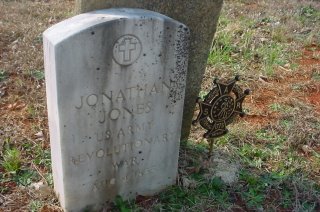Jonathan Jones (1757 - 1835) U.S. Army Revolutionary War
Orientation: Start with any of the nine Blackford children of Jessie Smith Blackford and Minnie Lee Jones (1890 – 1961),
Minnie’s father Jeptha Lorenzo Dow Jones (1861-1921),
Jeptha’s father, William Joseph Jones (1830-1894),
William’s father, Jonathan Jones (1805-1875),
Jonathan’s father, also Jonathan Jones (1757-1835)
This entry concerns Jonathan Jones (1757-1835). If you didn’t know it already, you are a daughter or son of the American Revolution! That means one of your ancestors fought in the American Revolutionary War. In this case, it’s Jonathan Jones. What makes this news even more exciting is that we have found information that brings more life to the facts. In the Roster of South Carolina Patriots in the American Revolution by Bobby Gilmer Moss, Jonathan Jones is listed on page 511. The entry shows his name, date of death, date of marriage and wife’s name. His date of marriage was March 8, 1787 to Elizabeth Downing. The entry says, “While residing in Chester District, he served during 1780 and 1781 under Capts. Alexander Pagan, John Wills, John McClure, William Smith, Cols. Patton and John Thomas, Jr. and General Sumter. He was in the battle at Blackstock’s Plantation. Salley, Doc., p. 99. A.A. 4109; M473; X2023.
In a second entry of his name in the same book, the following information is printed. “While residing in Chester District, he served one hundred thirty-four days in the militia during 1780 and 1781 under Capts. Alexander Pagan , John Mills and ___ Cooper. He was in the battles at Huck’s Defeat, Orangeburg, Congaree Fort, Fishing Creek and Blackstock’s Plantation. A.A. 4109; 1320.”
Information about an incident at Fishing Creek is engraved on a memorial to Rev. John Simpson at the Old Fishing Creek Presbyterian Church Cemetery in Chester County, S.C. It reads, “During this period Rev. Simpson was very outspoken for the American causes of liberty encouraging his congregations to fight for their freedom from Britain. Due to this Scotch-Irish Presbyterian Minister’s actions at Alexander’s Old Field and Mobley’s, the British Commander Christian Huck June 11, 1780 came to capture Rev. Simpson at Fishing Creek Church. Finding no one there he burned the church and killed William Strong then burned Simpson’s home and library leaving Mrs. Simpson and children homeless. These events of June 11, 1780 led to the Battle of Huck’s Defeat.”
Jonathan was a participant in the Battle of Fishing Creek, but I think the incident described above was not that battle. I think the incident had much to do with inciting the Battle of Huck’s Defeat which happened at the Williamson’s Plantation, South Carolina on July 12, 1780. In it patriot forces of Thomas Sumter’s command defeated Loyalist Christian Huck and his forces. Huck was killed.
The Battle of Fishing Creek happened after Huck’s Defeat on August 18, 1780. Lt. Col. Banastre Tarleton surprised Thomas Sumter’s (referred to in other places as “The Gamecock”) command and defeated it. In one reference I found on the internet the Battle of Fishing Creek was described as an American defeat that opened the door to North Carolina for the British. Another reference indicated that it was a “surprise night attack”.
However, using a timeline of Jonathan’s service, it looks as though Lt. Col. Banastre Tarleton should have left well enough alone. On November 20, 1780, at the Battle of Blackstocks Plantation, Tarleton pushed his cavalry in pursuit of Thomas Sumter and attacked. The British were beaten back with heavy casualties.
In the battle of Orangeburg, SC, on May 11, 1781, General Thomas Sumter took Orangeburg. I’ve found several references regarding Fort Congaree, but I have not been able to find information about an Am. Rev. battle at Fort Congaree.
If you’d enjoy reading more about General Thomas Sumter, here’s a good site: http://www.sumter-sc.com/AboutSumter/History_GenSumter.aspx
Jonathan was pensioned by the State of South Carolina at $60 per annum from 1826 and he died in Chester District, South Carolina. His wife, Elizabeth Downing was allowed pension by the United States on her application executed December 4, 1843, while living in Carroll County, Tennessee, age 78 years.
The following picture was taken of Jonathan's grave cite in the Old Fishing Creek Presbyterian Church Cemetery in Chester County, South Carolina.


2 Comments:
Thank you for this post. I'm also a descendant of Jonathan Jones, by way of John Downing Jones. I came upon your post doing a search for the battles Jonathan was involved in (for more details than you have here), but I love connecting with cousins!
Thank you for this information! I, too, am a decedent of Jonathan Jones and currently working on my DAR application. Very exciting to learn the stories our past generations have to tell us.
Post a Comment
<< Home